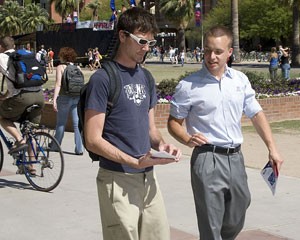Despite a thick stack of pamphlets he’s both nestled like infants and given away like old clothes, outgoing ASUA Sen. Mark Copoulos swears he hasn’t been just another solicitor on the UA Mall this week.
He’s paced to and fro in the name of what students may consider a futile task at the UA: getting them a good deal while buying and selling back textbooks.
Each afternoon – and ending today between 2 and 3:30 p.m. – Copoulos has disseminated information on programs the UofA Bookstore offers toward that end. “”When I ran for Senate, I walked into the bookstore and thought the prices were ridiculous. I thought I was a sheep being herded through a line,”” he said. “”I made it part of my platform to lower textbook prices, but when I got elected and found out what was going on, I realized it was impossible.””
Copoulos said he eschewed the politics of book pricing to devise a way he believed could get students to save some bucks.
He met with director Frank Farias and other UofA Bookstore officials three months ago about a pamphlet he created highlighting the store’s rental service and its page on a Web site where students can sell used books to their peers.
Farias and Co. liked what they saw and opted to provide $2,400 to produce 6,000 color copies.
Copoulos said he went to the bookstore first because it provides ASUA with about $100,000 of funding annually.
“”This is his campaign,”” Farias said. “”However, we do appreciate what he’s doing.””
Copoulos said he did not speak to any other campus-area bookstores to solicit their support, although he doesn’t want to dissuade students from looking elsewhere to buy and sell their books.
“”I’m just trying to save students as much money as they can,”” he said. “”I could care less how they save it.””
Goran Petkovic, a political science senior, is among students who would welcome a reprieve from cumbersome textbook prices, routinely in the hundreds of dollars each semester.
“”It’s a rip-off here,”” he said. “”It’s the main complaint I have, but I’m sure it’s the same of all students. It’s never low enough.””
Family studies junior Robert Harrold stopped with Copoulos yesterday to discuss the university perhaps taking over the provision of textbooks.
Harrold hopes the UA someday makes textbooks free online, which would save students having to go to a bookstore and the costs thereof, he said.
“”The system is not working,”” Harrold said.
He wasn’t bothered that the bookstore paid for Copoulos’ project.
“”His goals are what I want to support,”” Harrold said. “”I like student involvement, and it seems he just wants to change things. I’m all about change.””
Jeff Gabbitas, owner of the defunct Beat the Bookstore, doesn’t think UA-area bookstores will help students save money any time soon.
His store closed its Speedway location a month ago due to a lack of money, as too many students began bristling at its offer of in-store credit, rather than the up-front cash that competitors offer.
Gabbitas lamented the bookstores’ selling of “”custom-published”” textbooks, which are unique to courses each school year and feature unique ISBN numbers that don’t match those of editions found online, he said.
“”The unfortunate thing is the students, the poor students. They’re paying so much for their books,”” said Gabbitas, a doctoral student in second-language acquisition and teaching. “”It’d be one thing if they paid $100 for the books and got $50 back. With these custom-published books, (bookstores are) selling them for $140, because they can sell it for that much, and (students aren’t) getting anything back.””









